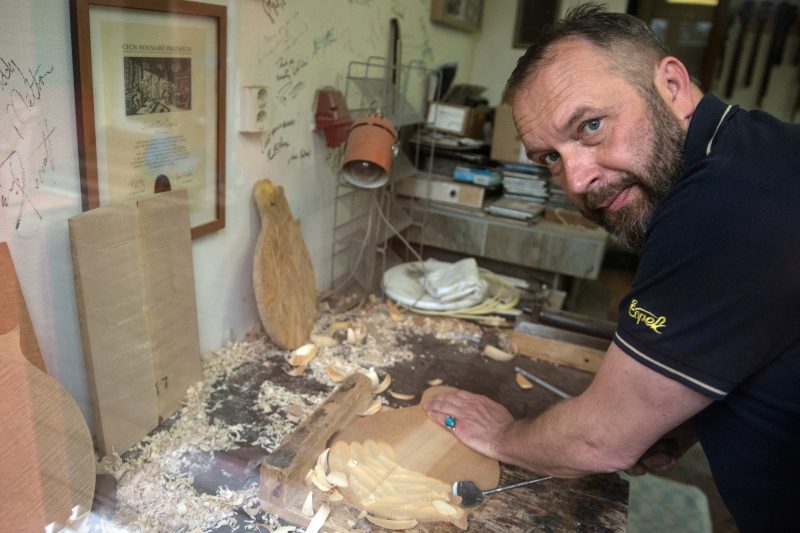Czech banjos, mandolins win over US bluegrass stars
Czech banjo and mandolin maker Rosta Capek grew up listening to bluegrass music and his parents were involved in ex-Czechoslovakia’s first and only women’s bluegrass group (Michal CIZEK)
Prague (AFP) – Star banjo player Ned Luberecki sits back in an armchair at a Prague music hall, contemplates the instrument he’s holding, then gently begins strumming.
“I’m still waiting on a name for it. I’ve just decided she’s a ‘she’. But it should be a Czech name,” the American musician says of his six-month-old handmade banjo, crafted in a tiny village tucked away on a Czech mountain range.
Luberecki, who was named the 2018 Banjo Player of the Year by the International Bluegrass Music Association (IBMA), is one of several renowned artists of the country and western style music to play banjos and mandolins made by Rosta Capek.
The Czech craftsman supplies instruments to the likes of 15-time Grammy winner Ricky Skaggs and Grammy nominee Doyle Lawson, both American bluegrass stalwarts.
Chasing away Flatt and Scruggs, his dog and cat named after the famous bluegrass duo formed in its early days in the 1940s, the 51-year-old Capek says he is living his dream.
“When Ricky Skaggs, a star of stars and an absolutely fabulous musician for many people, buys an instrument from you, it’s fantastic,” Capek told AFP, at his workshop in Chouzava, a village about 30 kilometres (19 miles) south of Prague.
– American and illicit –
Bluegrass was everywhere as Capek was growing up in a small flat in Prague — he would listen on tape to the sounds and songs of Bill Monroe, the originator of the musical style.
His father founded and managed ex-Czechoslovakia’s first and only women’s bluegrass group, in which Capek’s mother played banjo.
“I was sure I wouldn’t be a professional musician. I saw my parents rarely, they had 260 concerts a year.
“But my love for musical instruments led me to study at a violin making school,” he said.
Capek made his first banjo in 1985 when the country was still under communist rule.
He copied his mother’s Gibson, one of only two five-string banjos in the country, where all things American were strictly banned.
“Mum got the Gibson from a factory where she played a show with her band,” Capek said.
“Someone brought it there as a sample from the States but they thought it was lousy and that they could make a better one themselves,” Capek added with a chuckle.
– Czech, please! –
Communist rule played a major role in the development of the local bluegrass scene and the music’s popularity.
Over time, Czechoslovak bluegrass evolved from the country’s “tramp” movement that saw hundreds pack up and leave cities to roam the countryside at weekends between the two world wars.
Live music became the obvious pastime for long evenings by the campfire.
The slightly more liberal 1960s gave rise to full-blown bluegrass bands with names such as the Greenhorns or Rangers.
“The communists wouldn’t allow them to sing in English so they wrote Czech lyrics for bluegrass and country standards,” said Petr Brandejs, head of the Czech Bluegrass Association.
Sung in Czech, songs like “Jesse James”, “Orange Blossom Special” or “Folsom Prison Blues” soon found their way into the improvised and spontaneous jam sessions still beloved of many Czechs.
After the 1968 crackdown on the Prague Spring movement by Soviet-led armies, authorities forced bands with English names to change them to Czech ones if they wanted to perform.
They did and the music lived on.
“People went to the woods to be free even during communism. And when they played this American music there, they were even more free and they also showed opposition to the regime,” Brandejs told AFP.
– Bluegrass wedding –
Capek sold his first mandolin in the United States in 1995.
“The first one paid my air ticket so I was happy, but I still had a long way to go,” said the man, who now makes about a dozen mandolins and up to 50 banjos a year.
He cites patience, accuracy and a willingness to study other makers’ instruments as key to his craft.
“When we go to America now, we’re confident. We know we have top-quality instruments that the stars like to play,” he said.
Last year was special for Capek: he married his longtime assistant at a “bluegrass wedding,” his best man being the dobro player Rob Ickes, a 15-time IBMA Award winner.
Then in September, Luberecki — who has two custom-made Capek banjos — won his award.
“He won it with my banjo. It’s the biggest reward I ever got,” said Capek, who also organises bluegrass concerts in Prague.
Disclaimer: Validity of the above story is for 7 Days from original date of publishing. Source: AFP.


